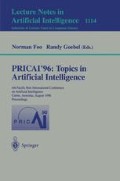Abstract
In this paper we introduce a system, SmartPlus, which learns recursive concepts from a small incomplete training set the members of which all lie on non-intersecting resolution path with respect to the target recursive theory and involve different constants. Unlike recent approaches to this learning problem, our method is based upon discovering the missing examples from the training set. Here missing examples mean the ground facts corresponding to the first recursive call of the given positive examples. After finding the missing examples SmartPlus perform a heuristic (independent of training set size) based top-down search through the hypothesis space in order to learn the recursive clauses. We provide some experimental results which verifies SmartPlus's capacity to learn recursive concepts from a small number of examples (4 to 5 positive examples and negative examples of the same order) all lying on non-intersecting resolution path involving different constants.
Preview
Unable to display preview. Download preview PDF.
References
D. W. Aha, S. Lapointe, C. X. Ling, and S. Matwin. Inverting implication with small training sets. In European Conference on Machine Learning, 1994.
W. W. Cohen. Pac-learning a restricted class of recursive logic programs. In 3rd International Workshop on Inductive Logic Programming, J. Stefan Institute, Ljubljana, Slovenia, 1993.
Peter Idestam-Almquist. Efficient induction of recursive definitions by structural analysis of saturations. In 5th International Workshop on Inductive Logic Programming, Leuven, Belgium, 1995.
Alipio Jorge and Pavel Brazdil. Architecture for iterative learning of recursive definitions. In 5th International Workshop on Inductive Logic Programming, Leuven, Belgium, 1995.
B. Kijsirikul, M. Numao, and M. Shimura. Efficient learning of logic programs with non-determinate, non-discriminating literals. In 8th International Workshop on Machine Learning, 1991.
S. Lapointe, C. Ling, and S. Matwin. Constructive inductive logic programming. In International Joint Conference on Artificial Intelligence, 1993.
S. Lapointe and S. Matwin. Sub-unification: A tool for efficient induction of recursive programs. In 9th International Workshop on Machine Learning, 1992.
Chowdhury Rahman Mofizur and Masayuki Numao. Top-down induction of recursive programs from small number of sparse examples. In Luc De Raedt, editor, Advances in Inductive Logic Programming, volume 32 of Frontiers in Artificial Intelligence and Applications. IOS Press, 1996.
S. Muggleton and C. Feng. Efficient induction of logic programs. In 1st International workshop on Algorithmic Learning Theory, 1990.
J. R. Quinlan. Learning logical definitions from relations. Machine Learning, 5:239–266, 1990.
Author information
Authors and Affiliations
Editor information
Rights and permissions
Copyright information
© 1996 Springer-Verlag Berlin Heidelberg
About this paper
Cite this paper
Mofizur, C.R., Numao, M. (1996). Learning simple recursive concepts by discovering missing examples. In: Foo, N., Goebel, R. (eds) PRICAI'96: Topics in Artificial Intelligence. PRICAI 1996. Lecture Notes in Computer Science, vol 1114. Springer, Berlin, Heidelberg. https://doi.org/10.1007/3-540-61532-6_31
Download citation
DOI: https://doi.org/10.1007/3-540-61532-6_31
Published:
Publisher Name: Springer, Berlin, Heidelberg
Print ISBN: 978-3-540-61532-3
Online ISBN: 978-3-540-68729-0
eBook Packages: Springer Book Archive

